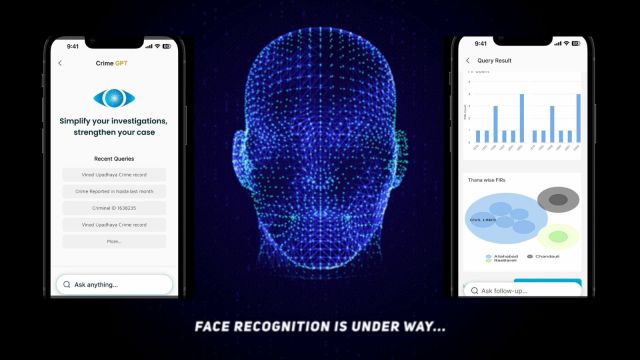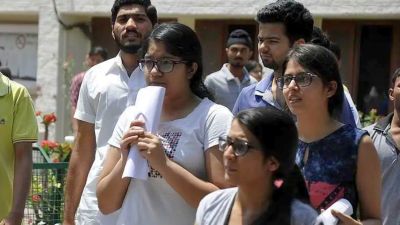- India
- International
How Crime GPT is using AI to help police forces with crime detection
Gurugram-based tech startup Staqu Technologies is hoping to help the police force with its AI-powered platform in tackling crime. Here’s how.
 Crime GPT utilises this criminal database and delivers results based on written and audio inputs. (Image: Staqu)
Crime GPT utilises this criminal database and delivers results based on written and audio inputs. (Image: Staqu)A pickpocket uses his sleight of hand to steal a wallet from an unsuspecting man’s pocket in a dimly lit alleyway in a crowded city. The man only finds out about the theft later and rushes to the nearest police station, with hopes of getting back his wallet and the important documents inside it.
This situation is all too familiar across India. However, there is not much the police can do, at least not in a sea of unstructured data and outdated record-keeping systems.
However, a Gurugram-based tech startup is hoping to change the game with its AI-powered platform. Staqu Technologies, founded in 2015 by a team of AI experts, has been quietly working towards redefining law enforcement in India. Their flagship product, Trinetra 2.0, integrates a powerful language model called Crime GPT, which is set to revolutionise the way security forces approach criminal investigations.
“When we talk about big data, videos and images are the largest data floating on the Internet currently. The idea was to target India’s big data and make these dumb or analogue cameras smarter,” Atul Rai, Staqu, Co-founder and CEO, told indianexpress.com.
The origin of Crime GPT
Rai, an AI researcher who holds a degree from the University of Manchester, collaborated with Anurag Saini and Pankaj Sharma to create a solution that could combat unique challenges faced by the police forces in India.

In 2018, the company created Trinetra 1.0, a platform that allows police forces to digitise their criminal records, including photographs and other key details. This led to the next phase which is harnessing AI to unlock the potential of this data. “Trinetra 2.0 is an extension of Trinetra where we have added the GPT which can also analyse the unstructured data in the form of text,” Rai explained.
According to Rai, sifting through thousands of physical documents made operations complex and time-consuming. This is where Crime GPT comes into play. Rai and his team have developed a customised large language model (LLM) that has been trained on a massive database of over 9,00,000 criminal records from Uttar Pradesh. By integrating Retrieval-Augmented Generation (RAG) techniques, the model can provide accurate and factual responses.
Rai said they introduced RAG with LLM with a transformer on crime data with certain architectural modifications to bring the generative power for crime analysis.
How does Crime GPT work?
Rai said their powerful combination allows Crime GPT to comprehend natural language queries and come up with relevant information from the unstructured data — First Information Reports (FIRs) and interrogation records.
To illustrate, Rai said in case a police officer is looking for a 21-year-old suspect who will be charged with Indian Penal Code (IPC) Section 307 (attempt to murder), Crime GPT will sift through the database, identify relevant records, and provide detailed information of the suspect’s history, associated crimes, and even list police stations with his recorded offences.
 Atul Rai, Co-founder, and CEO of Staqu Technologies.
Atul Rai, Co-founder, and CEO of Staqu Technologies.
“It can help as an effective assistant. For instance, some police forces do not have any platform. They can neither perform facial recognition or an audio search nor can they do any LLM search. So today, the police have a virtual assistant,” Rai said.
Rai’s team has also addressed the practical challenges of deploying such technology in the Indian context, where data is mostly in regional languages and unstructured formats. “The biggest challenge which we had here was the data was in Hindi, because when you start with LLMs or fundamental models most of the resources are in English,” Rai explained.
To overcome this, Staqu developed a suite of AI models that handle tasks like optical character recognition (OCR), translation, and tokenisation, ensuring that the Crime GPT can seamlessly process the diverse data inputs from the police force.
Ethical considerations and bias
Rai said the team at Staqu has placed a strong emphasis on ethical considerations, with a dedicated team from the Uttar Pradesh Special Task Force (UPSTF) closely monitoring the outputs of the system. “The bias problem is being resolved via the filtered data. We believe everyone should be trained and work on filtered data. As an AI engineer, I think it should work like that,” Rai asserted.
Rai said the impact of Staqu’s solutions is already being felt across India, with nine state police forces, including Uttar Pradesh, Bihar, Rajasthan, Haryana, and Punjab, actively using the Trinetra platform. The response from the ground has been overwhelmingly positive, with the demand for the technology spreading to other states like Madhya Pradesh, Chhattisgarh, and Tamil Nadu, he added.
“The integration of a digitised criminal database with AI-powered Crime GPT has revolutionised our investigative capabilities. This advanced technology allows for custom inputs, enabling our police force to access detailed information on persons of interest and criminals swiftly and accurately. Crime GPT efficiently processes both written and audio inputs, providing prompt retrieval of critical information, thereby expediting ongoing investigations and streamlining procedural formalities,” said Amitabh Yash, Additional Director General of Police (Law and order), UP Special Task Force.
Yash added that by leveraging trained LLM datasets, Crime GPT ensures the delivery of precise and timely information, enhancing operational efficiency at enforcement centres. This innovative solution marks a significant evolution in our approach to combating crime and maintaining public safety.
Talking about future priorities, Rai said that Staqu is looking forward to audio and video analytics. Rai envisions a world where every “dumb” CCTV camera can be transformed into an intelligent, AI-powered device, capable of generating real-time insights and alerts.
More Tech
May 05: Latest News
- 01
- 02
- 03
- 04
- 05






























